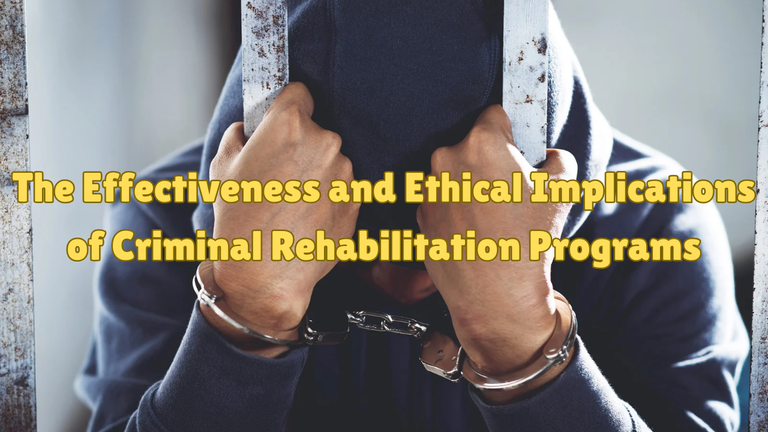The Effectiveness and Ethical Implications of Criminal Rehabilitation Programs
Rehab, or better yet, rehabilitation, is the process of helping people such as criminals, substance abusers, and the like recover from the state they're in via treatment, therapy, and counseling sessions to a point where they'll be ethically and socially acceptable again. That sounds like a great initiative, and through the years it has helped some people; however, not all criminals who pass through this phrase change, and today I'll love to share my opinion on the rehabilitation of criminals.

Rehabilitation centers are one great avenue to reshape individual perspectives and help them get through different mental health issues that might have led them to what brought them into rehab in the first place, and I guess it was a great plan by the government to not just keep publishing offenders but instead find a way to rehabilitate them into a decent individual suitable to live amongst other citizens without causing them harm in any way.
However, despite this wonderful plan that I admire by the government, the majority of criminals have taken it as a tool to trick the government and general public into believing that they've changed into a better person, and by the time some of them are out, they retract their steps back into the crime they're used to indulging in. This is disgusting and one reason why some people have clamored for the scrabbling of rehabilitation centers.
Can we blame those who clamor for such? I'll let you know because they've got their reasons, and I'll love to tell you one of them. Now, using my country of residence as a typical example of what happens during and after rehabilitation, you'll want to agree with those people that, in truth, there's no point trying to rehabilitate these criminals because they'll still retract their steps once they're out.

Now take Nigeria, for example. Here in Nigeria, we've got loads of criminals with different crimes, just like in every other country, from petty food thieves to traffic offenders and other weighty offenses such as kidnapping, murder, terrorism, and the like. And when it comes to rehabilitation, it's quite disheartening that most of the people who were put into the rehabilitation process are serious offenders, such as murderers, terrorists, and failed suicide bombers.
Of course, I understand they need rehabilitation to counsel and change their orientation, so they'll amount to something more meaningful in society. However, given their grievous offenses, it's disheartening to see that most of them are released back into society after a few months or just a year in that program, and before you know it, they'll team up again with their gang and cause more damage to the citizens.
While petty offenders such as load defaulters and traffic offenders could be sent to prison for the maximum number of years of their crime without any opportunities for rehab, this brings up the big question of whether it's much better to be a big offender than just a petty offender, because the big ones tend to be fairly considered and treated well than others.
One of the most popular rehabilitation centers set up here is for the notorious Boko Haram terrorist group, which is well known for killing both innocent citizens and the army, not forgetting the bombing of infrastructure and the kidnapping of schoolchildren. They address those who have kept their repentance, but the truth is that most of them are only trying to gain government trust by pretending that they've changed, only to get inside information and strike again.

And personally, for me, I don't think grievous offenders should be rehabilitated. In truth, I know some can be indotrinated from a tender age, but when it comes to killing your fellow man or causing them pain, normally you're supposed to have emotions to know that isn't right, because you won't enjoy such happenings happening to you, so rehabilitation for such people for me is a no-no.
Tax payers money, in my opinion, should be used for better causes like improving infrastructure and other important things that make life better for the citizens, not on a hardened criminal that has and would still most likely make life miserable for citizens, although if such were used to rehabilitate petty offenders, I wouldn't be against it, because when the offense is still small, it's much easier to counsel and change their mindset than when it's a critical offense.
Thanks so much for your time. I hope you enjoyed the read. Have a good day, and stay blessed.
Thumbnail designed on canva
Posted Using InLeo Alpha
I am impressed how you provides a critical perspective on rehabilitation in Nigeria, focusing on serious offenders like murderers and terrorists being released back into society with minimal impact.
Yes it's just disheartening, especially since the rehabilitation doesn't seem to work.